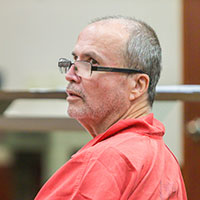 Will the Asbury Lee Perkins murder case finally go to trial, or drag on into 2023?
Will the Asbury Lee Perkins murder case finally go to trial, or drag on into 2023?
STORY BY LISA ZAHNER (Week of June 30, 2022)
Photo: Ashbury Perkins in court in 2017.
Whether a seven-year-old Island murder case will drag on into an eighth year before going to trial depends upon how tight a timetable Circuit Court Dan Vaughn sets for the parties to wrap up their preparations, but 2022 is half over and no trial date has been yet been set.
Asbury Lee Perkins, 64, is charged with the first-degree murder of his business partner and estranged wife, Cynthia Betts in November 2015. Her shooting death occurred in the Seagrape Lane home the couple once shared.
Despite a string of domestic violence disputes and a defunct protection order, Perkins and Betts still had contact as they ran a home-based business together supplying high-tech components to defense contractors.
Assistant State Attorney Bill Long, who took over prosecuting the case in December from Assistant State Attorney Chris Taylor who was on leave, asked Vaughn to end the delays and set a trial date, and Vaughn held a hearing on that motion two months ago.
“I have not received a scheduling order from the May hearing date,” Long said Monday. “I intend to try the case as soon as possible, and I certainly hope that is in 2022.”
This murder case is rather unique and complex because Perkins, after dismissing a series of defense attorneys due to disagreements over trial strategy, has chosen to represent himself.
He hand-writes pleadings from the Indian River County jail, interacts with the judge and prosecutor at hearings, and seeks state funds for hiring experts, advanced forensic testing and technical assistance.
Perkins claims he was temporarily insane or driven to snap and shoot Betts after many years of psychological abuse caused by false accusations, leading to heavy drinking and multiple arrests in three Florida counties where the couple lived.
After trying multiple times over the past three years to get a different judge assigned to his case, Perkins this month unsuccessfully appealed – once again – to the Fourth District Court of Appeals to have Vaughn removed from his case.
The defense also demanded access to certain discovery documents related to his psychological examination, and a written approval to work with more experts to help ready his case for trial.
Once Vaughn hands down a scheduling order, the case should move forward to a trial by a jury that would decide Perkins’ guilt or innocence. Then if Perkins is found guilty, the jury would separately decide whether Perkins should get the death penalty. The sentencing verdict must be unanimous to impose death.



